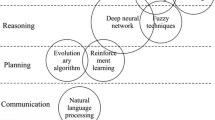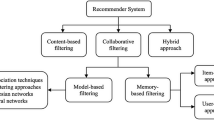Abstract
The purpose of recommender systems is to support humans in the purchasing decision-making process. Decision-making is a human activity based on cognitive information. In the field of recommender systems, critiquing has been widely applied as an effective approach for obtaining users’ feedback on recommended products. In the last decade, there have been a large number of proposals in the field of critique-based recommenders. These proposals mainly differ in two aspects: in the source of data and in how it is mined to provide the user with recommendations. To date, no approach has mined data using an adaptive clustering algorithm to increase the recommender’s performance. In this paper, we describe how we added a clustering process to a critique-based recommender, thereby adapting the recommendation process and how we defined a cognitive user preference model based on the preferences (i.e., defined by critiques) received by the user. We have developed several proposals based on clustering, whose acronyms are MCP, CUM, CUM-I, and HGR-CUM-I. We compare our proposals with two well-known state-of-the-art approaches: incremental critiquing (IC) and history-guided recommendation (HGR). The results of our experiments showed that using clustering in a critique-based recommender leads to an improvement in their recommendation efficiency, since all the proposals outperform the baseline IC algorithm. Moreover, the performance of the best proposal, HGR-CUM-I, is significantly superior to both the IC and HGR algorithms. Our results indicate that introducing clustering into the critique-based recommender is an appealing option since it enhances overall efficiency, especially with a large data set.






Similar content being viewed by others
Notes
In this work, we use the term user to refer to both an e-commerce customer/shopper (i.e., a human) and a recommender system user.
It is also referred to as critiquing-based recommendation in the literature.
In complex product spaces, users require a good knowledge of the large number of characteristics of the products and their relationship with the different available options to make a decision.
Analyzed by means of the Average Session Length, which measures the number of cycles that a user must work through before being presented with their ideal target product.
A perceptive feature is a feature that provides an immediate and intuitive recognition or appreciation of the qualities of a product. For example, in the SMARTPHONE domain, performance is a perceptive feature that intuitively includes more than one of the technical features of a product (e.g., storage, RAM, or CPU).
This data set is available on demand.
This data set has been used in [42] and it was kindly provided by the authors.
References
Burke R, Hammond K, Yound B. 1997. The FindMe approach to assisted browsing. IEEE Expert.
Charrad M, Ghazzali N, Boiteau V, Niknafs A, Charrad MM. Package ‘NbClust’. J Stat Softw 2014;61:1–36.
Chen L, Pu P. Preference-based organization interfaces: aiding user critiques in recommender systems. In: User modeling 2007. Springer; 2007. p. 77–86.
Chen L, Pu P. Critiquing-based recommenders: survey and emerging trends. User Model User-Adap Inter 2012;22(1-2):125–150.
Contreras D. Salamó: On the use of user-generated content in critiquing recommendation. In: Proceedings of the XVIII International Conference of the Catalan Association for Articial Intelligence; 2015. p. 195–204.
Contreras D, Salamȯ M, Rodríguez I, Puig A. A 3d visual interface for critiquing-based recommenders: Architecture and interaction. Int J Artif Intell Interact Multimed 2015;3(3):7–15.
Ding S, Zhang J, Jia H, Qian J. An adaptive density data stream clustering algorithm. Cogn Comput 2016;8(1):30–38. https://doi.org/10.1007/s12559-015-9342-z.
Dong R, O’Mahony M, Schaal M, McCarthy K, Smyth B. Sentimental product recommendation. Proceedings of the 7th ACM Conference on Recommender Systems. ACM; 2013. p. 411–414.
Dong R, Schaal M, O’Mahony M, McCarthy K, Smyth B. Opinionated product recommendation. Case-based reasoning research and development, LNCS. Springer; 2013. p. 44–58.
Dunn OJ. Multiple comparisons among means. J Am Stat Assoc 1961;56(293):52–64.
Elahi M, Ricci F, Rubens N. Active learning strategies for rating elicitation in collaborative filtering: a system-wide perspective. ACM Trans Intell Syst Technol 2014;5(1):13:1–13:33.
Eskandanian F, Mobasher B, Burke R. A clustering approach for personalizing diversity in collaborative recommender systems. Proceedings of the 25th Conference on User Modeling, Adaptation and Personalization. ACM; 2017. p. 280–284.
Friedman M. A comparison of alternative tests of significance for the problem of m rankings. Ann Math Stat 1940;11(1):86–92.
Gavalas D, Kenteris M. A web-based pervasive recommendation system for mobile tourist guides. Pers Ubiquit Comput 2011;15(7):759–770.
Huang Z. A fast clustering algorithm to cluster very large categorical data sets in data mining. DMKD 1997;3 (8):34–39.
Huang Z. Extensions to the k-means algorithm for clustering large data sets with categorical values. Data Min Knowl Discov 1998;2(3):283–304.
Jia H, Ding S, Du M. Self-tuning p-spectral clustering based on shared nearest neighbors. Cogn Comput 2015;7(5):622–632. https://doi.org/10.1007/s12559-015-9331-2.
Kelly III J. 2015. Computing, cognition and the future of knowing, how humans and machines are forging a new age of understanding. IBM Research: Cognitive Computing. IBM Corporation.
Kim S, McLoone SF, Byeon J, Lee S, Liu H. Cognitively inspired artificial bee colony clustering for cognitive wireless sensor networks. Cogn Comput 2017;9(2):207–224. https://doi.org/10.1007/s12559-016-9447-z.
Koren Y, Bell R. Advances in collaborative filtering. Recommender systems handbook. Springer; 2011. p. 145–186.
Kuzelewska U. Clustering algorithms in hybrid recommender system on movielens data. Stud Logic Grammar Rhetor 2014;37(1):125–139.
Lee W, Lin C. Combining expression data and knowledge ontology for gene clustering and network reconstruction. Cogn Comput 2016;8(2):217–227. https://doi.org/10.1007/s12559-015-9349-5.
MacQueen J, et al. Some methods for classification and analysis of multivariate observations. Proceedings of the fifth Berkeley symposium on mathematical statistics and probability. Oakland; 1967. p. 281–297.
Mandl M, Felfernig A. Improving the performance of unit critiquing. User modeling, adaptation, and personalization. Springer; 2012. p. 176–187.
McCarthy K, Salamó M, Coyle L, McGinty L, Smyth B, Nixon P. Group recommender systems: a critiquing based approach. Proceedings of the 11th International Conference on Intelligent User Interfaces, IUI ’06. ACM Press; 2006. p. 267–269.
McCarthy K, Salem Y, Smyth B. Experience-based critiquing: reusing critiquing experiences to improve conversational recommendation. Proceedings of the International Conference on Case Base Reasoning. Springer; 2010. p. 480–494.
McGinty L, Reilly J. On the evolution of critiquing recommenders. Recommender systems handbook. Springer; 2011. p. 419–453.
Pazzani M, Billsus D. The Adaptive Web: Methods and Strategies of Web Personalization, chap. Content-based recommendation Systems. Berlin: Springer; 2007, pp. 325–341.
Pham MC, Cao Y, Klamma R, Jarke M. A clustering approach for collaborative filtering recommendation using social network analysis. J Univ Comput Sci (j-jucs) 2011;17(4):583–604.
Pitsilis G, Zhang X, Wang W. Clustering recommenders in collaborative filtering using explicit trust information. Trust Management V. In: Wakeman I, Gudes E, Jensen CD, and Crampton J, editors. Berlin: Springer; 2011. p. 82–97.
Pu P, Faltings B, Chen L, Zhang J, Viappiani P. Usability guidelines for product recommenders based on example critiquing research. Recommender systems handbook. Springer; 2011.
Reilly J, McCarthy K, McGinty L, Smyth B. Dynamic critiquing. Advances in case-based reasoning, lecture notes in computer science. Springer; 2004. p. 763–777.
Reilly J, McCarthy K, McGinty L, Smyth B. Incremental critiquing. Knowl-Based Syst 2005;18 (4-5):143–151.
Reilly J, Zhang J, McGinty L, Pu P, Smyth B. A comparison of two compound critiquing systems. Proceedings of the 12th International Conference on Intelligent User Interfaces. USA: ACM; 2007. p. 317–320.
Ren P, Sun W, Luo C, Hussain A. Clustering-oriented multiple convolutional neural networks for single image super-resolution. Cogn Comput 2018;10(1):165–178. https://doi.org/10.1007/s12559-017-9512-2.
Ricci F, Nguyen Q. acquiring and revising preferences in a Critique-based mobile recommender system. IEEE Intell Syst 2007;22(3):22–29.
Ricci F, Rokach L, Shapira B, Kantor PB, (eds). 2011. Recommender Systems Handbook. Berlin: Springer.
Salamó M, Escalera S. Increasing retrieval quality in conversational recommenders. IEEE Trans Knowl Data Eng 2012;24(10):1–14.
Salamó M, Reilly J, McGinty L, Smyth B. Improving incremental critiquing. In: Proceedings of the 16th artificial intelligence and cognitive science; 2005. p. 379–388.
Salamó M, Reilly J, McGinty L, Smyth B. Knowledge discovery from user preferences in conversational recommendation. Proceedings of the 9th European Conference on Principles and Practice of Knowledge Discovery in Databases. Springer-Verlag; 2005. p. 228–239.
Salem Y, Hong J. History-aware critiquing-based conversational recommendation. Proceedings of the 22Nd International Conference on WWW Companion. Switzerland; 2013. p. 63–64.
Salem Y, Hong J, Liu W. History-guided conversational recommendation. In: Proceedings of the 23rd International Conference on WWW Companion; 2014. p. 999–1004.
Thanh ND, Ali M, Son LH. A novel clustering algorithm in a neutrosophic recommender system for medical diagnosis. Cogn Comput 2017; 9(4): 526–544. https://doi.org/10.1007/s12559-017-9462-8.
Viappiani P, Faltings B, Pu P. Preference-based search using example-critiquing with suggestions. J Artif Intell Res 2006;27:465–503.
Zhang J, Jones N, Pu P. A Visual interface for critiquing-based recommender systems. Proceedings of the 9th ACM conference on Electronic commerce. ACM; 2008. p. 230–239.
Zhang J, Pu P. A comparative study of compound critique generation in conversational recommender systems. Adaptive hypermedia and adaptive web-based systems, lecture notes in computer science. Springer; 2006. p. 234–243.
Zhang Z, Zhao X, Wang g. FE-ELM: A new friend recommendation model with extreme learning machine. Cogn Comput 2017;9(5):659–670. https://doi.org/10.1007/s12559-017-9484-2.
Funding
This study was supported by Spanish Ministry of Science and Innovation (grant number TIN2015-71147-C2-2) and by Agència de Gestió d’Ajuts Universitaris i de Recerca, Generalitat de Catalunya, AGAUR (grant number SGR-2017-341).
Author information
Authors and Affiliations
Corresponding author
Ethics declarations
Conflict of interests
The authors declare that they have no conflict of interest.
Ethical approval
This article does not contain any studies with human participants or animals performed by any of the authors.
Rights and permissions
About this article
Cite this article
Contreras, D., Salamó, M. A Cognitively Inspired Clustering Approach for Critique-Based Recommenders. Cogn Comput 12, 428–441 (2020). https://doi.org/10.1007/s12559-018-9586-5
Received:
Accepted:
Published:
Issue Date:
DOI: https://doi.org/10.1007/s12559-018-9586-5




